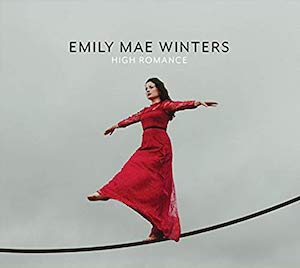 Emily Mae Winters – High Romance
Emily Mae Winters – High Romance
Self-Released – 19 July 2019
Having heard her perform two of the numbers live, I knew this was going to be one of my album’s of the year before she’d even recorded it. I was greatly impressed by the Birmingham-born singer-songwriter’s debut, Siren Serenade, but, with its title inspired by a line in a Keats poem, High Romance marks a quantum leap that sees her fully immersed in her Southern Americana influences, her voice variously as powerful as a raging thunderstorm or as gentle as a butterfly’s wing.
Again working with Ben Walker on electric guitar, this time round she’s joined by John Parker on double bass and producer Matt Ingram on drums and piano. She opens in vocally blistering form with the sole non-original, Come Live In My Heart & Pay No Rent, a part re-written gospel-blues slow waltz setting of a poem by 19th-century Irish writer Samuel Lover. That track alone would repay purchase, but there’s still a further ten equally breathtaking numbers ranged around variegated themes of love to follow. First up is This Land, conjuring Gretchen Peters and Gillian Welch in an atmospheric dark evocation of Southern gothic with rumbling percussion, E bow and burning guitar work from Walker that addresses themes of displacement and people movement in search of home only to be met with hostility as “people call me stranger, share no burden, share no seeds that I can sew” as she climaxes with the defiant cry “I’m, of the earth, I’m of the air, I’m of the land.”
She slows the pacing and softens the sound slightly for the soulful slow sway of Would The World Stop Turning? with Parker’s double bass the heartbeat on another song veined by restlessness and journeying, the way the road can wear you down and the cost of expectations of breaking the mould when you just want to “pull the brakes on the strife.”
Forged in the same furnace of molten passions, the chorus soaring Wildfire hits an upbeat, desert- twang, blues-streaked country-pop vein that comes with a Stevie Nicks gutsiness and already sounds like a classic as she sings “I’ve got embers in my soul, they’re prone to spark without control.”
A handclap and bass drum stomp underpin the burning bluesy Gin Tingles & Whiskey Shivers, lustful electric guitar bolstering a smouldering erotic song that, fuelled by the liberation of a bourbon or eight, again speaks of letting desires off the leash and pressing play on the “hidden jukebox of sin” as she invites “put your hands round my waist, feel the rhythm just right.” You don’t need a degree in euphemisms to know where “grab your paddle and row” is heading.
Featuring strummed acoustic, steel guitar and harmonium, the gradually building rhythmic sway of How Do You Fix A Broken Sun? again challenges superlatives on a song that might suggest an environmental climate change reading but which, on closer listening, reveals itself as about depression (“It’s been a long afternoon with no light on my face”) and loss of inspiration.
Her voice catching cracks of breathy emotion between the warble, a simpler arrangement of bowed bass and acoustic guitar serves the intimately sung Take Me In, the album’s most nakedly vulnerable song (“the air is spinning cold, I am locked out of my home…keep me warm so I can make it through this night”), one which again draws on the image of the outside and the lost.
Shifting style and approach, Flaming Rose is both full band Americana rock and a narrative based storysong (its core coincidentally echoing the recent Wild Rose) of a telesales office worker who spends “a long eight hours selling bad ideas”, finding escape at night, remembering “that fateful day when the circus came to town” and filled her with dreams, playing song and pretending she’s holding the crowd enraptured as she “feels the rush of this high romance.”
Opening with double bass reverb and riding a percussive handclap walking beat,a different musical texture shapes Closer with an urgent, upbeat 60sish r&b vibe that, another let it all go and “throw caution to the wind” rallying cry, will doubtless prompt further Nicks comparisons but which, to my ears, calls to mind the great Tanya Tucker.
While it may seem to refer to the balancing act over image, the penultimate cut, the softly pulsing Across The Wire is in fact a piano ballad love song about separation and sending a midnight email that carries with it another sense of loss or unfulfilled promise in the line “what life we might have known had we set these words aglow.”
It ends on a simple stripped back acoustic note, harmonium coloured, intimately sung One Of These Days, a song of love and hope, of mother and child, of consolation and of rising from dust and forging new worlds and (thematically echoing CS&N’s Teach Your Children) new futures summed up in the inspirational refrain “One of these days we’ll raise a cry for all the stolen times gone by. A new found living, teach our children to say:one of these days.”
Four years ago, Gretchen Peters’ Blackbirds set the benchmark by which future Americana albums would be measured. Winters has set a new one.
https://www.emilymaewinters.com

